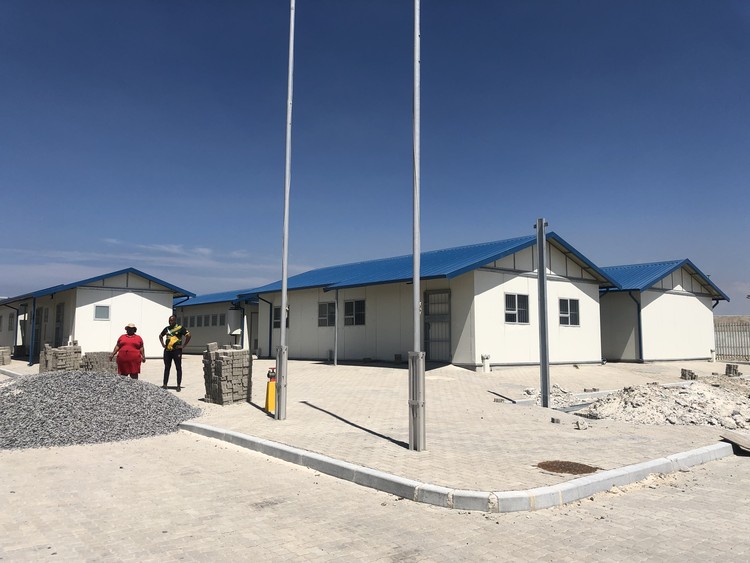New Makhaza police station can’t open because there’s no water or electricity
The station was completed at the end of December after a 10-year wait
Several prefabricated structures stand empty at the site of the new police station in Makhaza in Khayelitsha, Cape Town. Photo: Mary-Anne Gontsana
- The temporary Makhaza police station has finally been completed.
- But SAPS can’t operate from the site because there is no water or electricity.
- Eskom and the City of Cape Town say that the delay is not their fault.
- In the meantime, Makhaza residents have access to basic policing services at a mobile police unit situated inside a nearby mall.
Several prefabricated structures are standing empty, without water or electricity, on the site of the police station in Makhaza in Khayelitsha, Cape Town.
In December, the South African Police Service (SAPS) told GroundUp that the station would be fully operational by the end of 2023, “if construction is not delayed by unforeseen circumstances”. This will be the site of a temporary police station until a permanent station is built in the 2025/26 financial year, police say.
But nearly two months later, the buildings meant to house SAPS officers are still not open to the public. In the meantime, SAPS says, the Makhaza community is being policed by 24-hour patrols and basic police services are offered from a mobile police unit in a nearby mall.
Poor policing and the lack of resources in communities like Makhaza were among the main complaints highlighted by local residents during the Khayelitsha Commission of Inquiry into Policing in 2014. One of the Commission’s recommendations was that a new police station be built in Makhaza.
Several blue and white prefab units on the site appear to be unfurnished. There are two water tanks; the grounds are paved and there is fencing. But even though the units appear to be ready, there is no electricity or water.
Asked why the station was not yet open, Western Cape SAPS spokesman André Traut said: “Unforeseen construction delays have hampered the inauguration of the temporary Makhaza police station, however plans are afoot to complete the project as a matter of urgency.”
At the new police station site, Makhaza resident Nolanga Fetye blamed the City of Cape Town and Eskom for delays with connections to electricity and water. Fetye was appointed by the community to liaise with the police about the new station and report back.
But both Eskom and the City have denied that they are the cause of the delays.
Mayco member for Spatial Planning and Environment, Eddie Andrews, said that SAPS had submitted a “courtesy” building plan in May 2023 to the City’s Development Management Department.
“It was finalised with a number of outstanding requirements.”
He said it was up to SAPS to comply with the requirements stipulated by the City.
Eskom spokesperson Kyle Cookson confirmed that the power utility had received a request for a quote for the installation of electricity at the station. The quote had been sent on 30 October 2023 but Eskom had not heard back, Cookson said.
“A customer is required to sign the acceptance letter and submit it within 30 days before the quote expires,” said Cookson.
Fetye said people in Makhaza had “high hopes and expectations for this police station”.
But Traut would not say how many officers would be deployed there. “We are not at liberty to divulge such information as it is an operations matter. It is not information for the public,” he said.
Next: Alleged extortionists appear in Mamelodi court
Previous: Cofimvaba scholar transport protest enters third week
© 2024 GroundUp. This article is licensed under a Creative Commons Attribution-NoDerivatives 4.0 International License.
You may republish this article, so long as you credit the authors and GroundUp, and do not change the text. Please include a link back to the original article.
We put an invisible pixel in the article so that we can count traffic to republishers. All analytics tools are solely on our servers. We do not give our logs to any third party. Logs are deleted after two weeks. We do not use any IP address identifying information except to count regional traffic. We are solely interested in counting hits, not tracking users. If you republish, please do not delete the invisible pixel.



